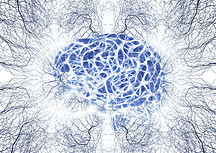
Eye Movement Desensitisation Reprocessing Therapy
(EMDR)
Many psychologists and researchers agree that psychological distress often stems from disrupted communication between different areas of the brain. EMDR is based on the idea that intense emotions—especially those experienced during trauma—can interfere with how memories are stored. This disruption can cause these memories to become “stuck” and disconnected from healthier, more adaptive memory networks. EMDR is specifically designed to help reprocess these experiences and restore balance within the brain and nervous system by activating our natural healing capacity, known as the adaptive information processing system.
In an EMDR session, the client focuses on a troubling memory—along with its associated images, feelings, sensations, or beliefs—while simultaneously engaging in bilateral stimulation, such as side-to-side eye movements or alternating sounds. This process allows the brain to locate and process memories that are held in survival-based neural patterns. As the memory is metabolised, its emotional intensity diminishes, and it becomes reintegrated into the brain’s wider network. Even if the client can't recall a specific memory, EMDR can work directly with the physical or emotional symptoms through body-based channels.
EMDR facilitates change at a neurological level. While past events cannot be erased, their emotional charge can be greatly reduced. One of the key advantages of EMDR is that it doesn’t require detailed discussion of the traumatic event. The process is often quicker and more comfortable than traditional talk therapies, and many clients report feeling noticeably calmer, more confident, and more at ease in their own skin.
EMDR is a widely respected and evidence-based therapy. It is recommended by the National Institute for Health and Care Excellence (NICE) and other international bodies for the treatment of Post-Traumatic Stress Disorder (PTSD), and is commonly used within the NHS. In addition to PTSD, numerous peer-reviewed studies have shown its effectiveness in treating phobias, anxiety disorders, grief, low self-esteem, complex trauma, chronic pain, addiction, and anger issues.
EMDR can be used as a standalone treatment or integrated with other therapeutic approaches, such as Internal Family Systems (IFS), Sensorimotor Psychotherapy or Cognitive Behavioural Therapy (CBT), depending on each client’s individual needs.
"WE ARE NOT CHANGING WHAT HAPPENED TO US, WE ARE CHANGING THE WAY IT LIVES WITHIN US."
- Unknown
